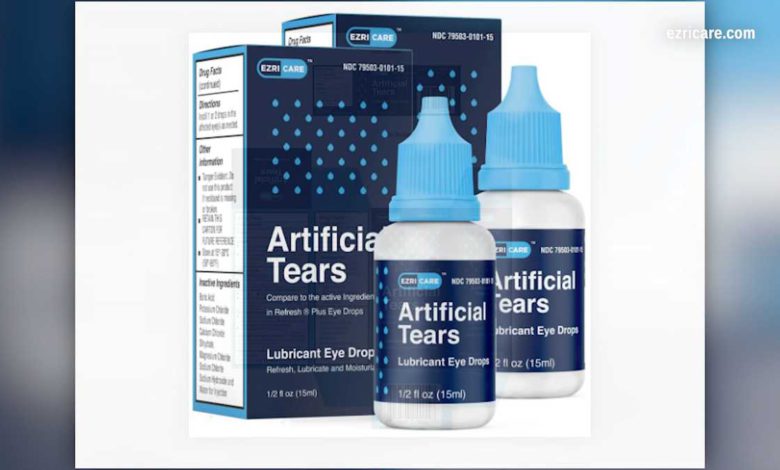
NEWSCENTER 5 AT 5:30. >> AN URGENT ALERT ABOUT A NATIONAL BRAND OF EYEDROPS EXPECT -- SUSPECTED OF CAUSING SERIOUS EYE INFECTIONS IN AT LEAST 11 STATES. HE HAD TO EXPLAIN IS THE CHIEF OF INFECTIOUS DISEASE AT BRIGHAM AND WOMEN’S HOSPITAL. THANK YOU FOR BEING WITH US. >> GOOD AFTERNOON. THE PRODUCT AS YOU KNOW IS CALLED AS WE CARE ARTIFICIAL TEARS. WHY IS THIS EDC NOT ASKING PEOPLE TO STOP USING THAT PRODUCT? >> THERE ARE TWO CONCERNING THINGS ABOUT IT. ONE, IT APPEARS THIS PRODUCT HAS BEEN CONTAMINATED WITH THIS AGGRESSIVE BACK TO THE -- BACTERIA WHICH IS A WATERBORNE ORGANISM, REALLY HARMLESS BECAUSE IT GETS INTO THE EYE AND OTHER PARTS OF THE BODY THAT CAN BE REALLY SERIOUS. THE SECOND PROBLEM IS THIS PARTICULAR STRAIN IS HIGHLY ANTIBIOTIC RESISTANT, MAKING IT VERY DIFFICULT TO TREAT. >> THE CDC SAYS THE PRODUCT IS PRESERVATIVE FREE. WHY IS THAT IMPORTANT? >> IT IS WATERBORNE. WE KNOW THESE KINDS OF PRODUCTS CAN BECOME CONTAMINATED. WHEN THEY ARE MANUFACTURED OR USED. IT IS IMPORTANT TO USE AN EYEDROP WITH A PRESERVATIVE IN IT. OR IF YOU’RE GOING TO KEEP IT REFRIGERATED. >> MANY PEOPLE MAY EXPERIENCE SOME LEVEL OF EYE IRRITATION OR REDNESS DURING THE DAY. WHAT ARE THE SIGNS THAT THERE -- THAT SO MUCH AND LOOK OUT FOR THAT THERE COULD BE AN INFECTION ? >> THERE ARE A NUMBER OF THINGS. . IF THERE IS ANY PAIN OR CHANGE IN YOUR VISION THAT IS A CONCERN, SWELLING OF THE EYELID, ESPECIALLY REDNESS AROUND THE EYELID IS A PROBLEM. THE BULGING OF THE EYE ITSELF, ALL OF THOSE THINGS COULD BE A PROBLEM. THAT CAN SOMETIMES BE AN INDICATION THAT YOU HAVE AN EROSION OF THE CORNEA. ALL OF THESE THINGS WOULD NEED MEDICAL ATTENTION. >> WE ALWAYS APPRECIAT
CDC advises against using EzriCare eye drops as it investigates at least 55 infections and 1 death
The U.S. Centers for Disease Control and Prevention is urging health care providers and consumers to stop using EzriCare Artificial Tears as it conducts an investigation into at least 55 infections in 12 states that have led to instances of permanent vision loss, hospitalization and one death.Most people with infections reported using at least one of more than 10 brands of artificial tears, and the majority of these patients reported using EzriCare's product, the agency says. These eye drops are preservative-free, meaning they don't have ingredients to prevent bacterial growth.The CDC says it received reports of infections of the cornea, intraocular fluids, respiratory tract and urinary tract, as well as sepsis.Testing of open EzriCare bottles identified Pseudomonas aeruginosa bacteria that are resistant to a broad array of antibiotics: cefepime, ceftazidime, piperacillin-tazobactam, aztreonam, carbapenems, ceftazidime-avibactam, ceftolozane-tazobactam, fluoroquinolones, polymyxins, amikacin, gentamicin and tobramycin. However, bacterial isolates that were tested against cefiderocol were susceptible to it.The bacteria in the open bottles could have come from contamination either during use or during the manufacturing process, the CDC says. Testing of unopened bottles is ongoing.New Jersey-based EzriCare says in a statement that after learning about the investigation Jan. 20, it "immediately took action to stop any further distribution or sale of EzriCare Artificial Tears. To the greatest extent possible, we have been contacting customers to advise them against continued use of the product."The eye drops are made in India, and "we understand that the same product is also marketed under other brand names," the company says. The manufacturer, Global Pharma Healthcare PVT Limited, is working with the U.S. Food and Drug Administration on a recall, EzriCare says.The CDC urges health care providers to immediately stop using EzriCare Artificial Tears. They should advise their patients who use this product to watch for signs of infection and ask about product use in patients who have eye infections.The CDC also advises consumers to stop using these EzriCare eye drops and to ask for alternative products if their health care provider recommended EzriCare.Pseudomonas bacteria are common in the environment, such as in soil and water. Pseudomonas aeruginosa is usually spread in health care settings, the CDC says, and is increasingly difficult to treat because of antibiotic resistance. It caused more than 32,000 infections in hospitalized patients and about 2,700 deaths in the U.S. in 2017.
The U.S. Centers for Disease Control and Prevention is urging health care providers and consumers to stop using EzriCare Artificial Tears as it conducts an investigation into at least 55 infections in 12 states that have led to instances of permanent vision loss, hospitalization and one death.
Most people with infections reported using at least one of more than 10 brands of artificial tears, and the majority of these patients reported using EzriCare's product, the agency says. These eye drops are preservative-free, meaning they don't have ingredients to prevent bacterial growth.
The CDC says it received reports of infections of the cornea, intraocular fluids, respiratory tract and urinary tract, as well as sepsis.
Testing of open EzriCare bottles identified Pseudomonas aeruginosa bacteria that are resistant to a broad array of antibiotics: cefepime, ceftazidime, piperacillin-tazobactam, aztreonam, carbapenems, ceftazidime-avibactam, ceftolozane-tazobactam, fluoroquinolones, polymyxins, amikacin, gentamicin and tobramycin. However, bacterial isolates that were tested against cefiderocol were susceptible to it.
The bacteria in the open bottles could have come from contamination either during use or during the manufacturing process, the CDC says. Testing of unopened bottles is ongoing.
New Jersey-based EzriCare says in a statement that after learning about the investigation Jan. 20, it "immediately took action to stop any further distribution or sale of EzriCare Artificial Tears. To the greatest extent possible, we have been contacting customers to advise them against continued use of the product."
The eye drops are made in India, and "we understand that the same product is also marketed under other brand names," the company says. The manufacturer, Global Pharma Healthcare PVT Limited, is working with the U.S. Food and Drug Administration on a recall, EzriCare says.
The CDC urges health care providers to immediately stop using EzriCare Artificial Tears. They should advise their patients who use this product to watch for signs of infection and ask about product use in patients who have eye infections.
The CDC also advises consumers to stop using these EzriCare eye drops and to ask for alternative products if their health care provider recommended EzriCare.
Pseudomonas bacteria are common in the environment, such as in soil and water. Pseudomonas aeruginosa is usually spread in health care settings, the CDC says, and is increasingly difficult to treat because of antibiotic resistance. It caused more than 32,000 infections in hospitalized patients and about 2,700 deaths in the U.S. in 2017.
Source link








